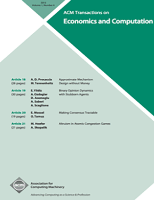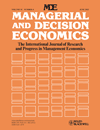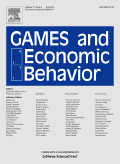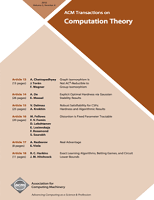
ACM Transactions on Economics and Computation
Scope & Guideline
Pioneering Research at the Crossroads of Data and Economics
Introduction
Aims and Scopes
- Algorithmic Game Theory:
Research related to the design and analysis of algorithms in strategic settings, including auction design, mechanism design, and equilibrium computation. - Market Design and Mechanism Design:
Studies focusing on the creation of efficient and fair mechanisms for various market scenarios, including auctions, matching markets, and public goods allocation. - Computational Economics:
Exploration of economic models through computational methods, addressing issues like resource allocation, pricing strategies, and the dynamics of economic systems. - Fairness and Efficiency in Allocation Problems:
Investigations into the balance between fairness and efficiency in resource allocation, including topics like envy-freeness, proportionality, and stability. - Network Economics:
Examination of economic behaviors and outcomes in networked environments, including congestion games, social networks, and decentralized systems.
Trending and Emerging
- Blockchain and Decentralized Systems:
Recent studies highlight the growing importance of blockchain technology and decentralized systems in economic contexts, particularly in areas like reward sharing and market dynamics. - Online Algorithms and Dynamic Matching:
The focus on online algorithms, especially in task assignment and market matching scenarios, indicates a trend towards addressing real-time decision-making in uncertain environments. - Fairness in Algorithmic Design:
An increasing emphasis on fairness in algorithmic processes reflects a broader societal concern for equitable outcomes, particularly in resource allocation and market mechanisms. - Price of Anarchy and Efficiency Analysis:
Research exploring the Price of Anarchy in various economic settings suggests a growing interest in the efficiency of decentralized systems and their implications for economic outcomes. - Learning and Adaptive Mechanisms:
Emerging themes related to learning frameworks in economic settings, including adaptive mechanisms and the use of learning algorithms to improve decision-making in dynamic environments.
Declining or Waning
- Traditional Game Theory without Computational Insights:
There seems to be a reduced focus on classical game theory concepts that do not incorporate computational methods or algorithmic perspectives, indicating a shift towards more applied computational approaches. - Static Economic Models:
Research involving static economic models, which do not consider dynamic or computational factors, appears to be waning as the journal emphasizes more dynamic and algorithm-driven analyses. - Single-Agent Decision Problems:
Topics centered solely on individual decision-making without considering strategic interactions or multi-agent frameworks are becoming less prominent, as the journal increasingly favors studies involving multiple agents and their interactions.
Similar Journals

INTERNATIONAL JOURNAL OF GAME THEORY
Decoding the Art of Strategic ThinkingINTERNATIONAL JOURNAL OF GAME THEORY, published by Springer Heidelberg, is a distinguished journal dedicated to the rigorous exploration of game theory across multiple disciplines, encompassing economics, mathematics, social sciences, and statistics. Established in 1971, this journal has become a pivotal resource for scholars and practitioners seeking to deepen their understanding of strategic interactions and decision-making processes. With ISSN 0020-7276 and E-ISSN 1432-1270, the journal spans its focus on theoretical advancements and practical applications in game theory. The journal currently ranks in the Q2 and Q3 quartiles across various categories, reflecting its impact and relevance in the academic community. Although not an open-access journal, it continues to provide invaluable insights for researchers, professionals, and students aiming to advance their knowledge in this critical area of study. The journal's commitment to fostering intellectual discourse is evident through its comprehensive coverage of topics relevant to modern-day challenges, positioning itself as an essential platform in the academic landscape.

Genetic Programming and Evolvable Machines
Exploring the Intersection of Nature and MachineGenetic Programming and Evolvable Machines, published by SPRINGER, is a leading journal dedicated to the fields of genetic algorithms, evolutionary computation, and machine learning. With an ISSN of 1389-2576 and an E-ISSN of 1573-7632, this esteemed journal encompasses original research articles, reviews, and applications that explore the intricate relationships between intelligent systems and evolutionary processes. As of 2023, it holds a notable Q2 ranking in various categories including Computer Science Applications and Hardware and Architecture, reflecting its significant impact in advancing knowledge and methodologies within these domains. The journal's metrics, including a top rank of #31/130 in Theoretical Computer Science, signify its relevance and contribution to the broader academic community. Though not open access, papers published in the journal continue to serve as critical resources for both researchers and practitioners, promoting innovative methodologies and solutions. Covering a broad scope with a convergence extending from 2003 to 2024, this journal remains a pivotal platform for sharing cutting-edge research that shapes the future of artificial intelligence and computational theory.

MANAGERIAL AND DECISION ECONOMICS
Transforming Research into Actionable Management SolutionsMANAGERIAL AND DECISION ECONOMICS is a highly regarded academic journal published by John Wiley & Sons Ltd that serves as a vital resource in the field of business and management. With an ISSN of 0143-6570 and an E-ISSN of 1099-1468, this journal has established itself as a prominent platform for disseminating cutting-edge research from its inception in 1980 through to 2024. Currently ranked in the Q2 category across multiple fields—including Business and International Management, Management of Technology and Innovation, Management Science and Operations Research, and Strategy and Management—it highlights significant contributions within these domains. The journal is based in the United Kingdom and contributes to the ongoing dialogue and development of innovative managerial practices driven by empirical decision-making research. Although the journal does not offer open access, it remains highly influential, with noteworthy Scopus rankings showing its strong impact within the scholarly community. Researchers, professionals, and students alike will find valuable insights and advancements in management science that inform and enrich their practices and academic pursuits.

Games
Decoding the Complexities of Games with Rigorous Research.Games, published by MDPI, is an influential open-access journal launched in 2010 that explores the multifaceted realm of games through the lenses of applied mathematics, statistics, and decision sciences. Hailing from Switzerland, this journal has developed a unique position in the academic landscape, focusing on innovative research that examines theoretical and practical implications of games in various contexts. With an impressive convergence of literature from 2010 to 2024 and an evolving scope that aligns with contemporary research trends, Games has achieved a respectable ranking in its respective categories, including Q3 in Applied Mathematics and Statistics. Offering rapid publication and a commitment to accessibility, the journal invites researchers, professionals, and students to contribute and engage with groundbreaking findings that push the boundaries of game theory, analytics, and their applications. With an increasing interest in game-based learning and gamification across disciplines, Games is essential reading for anyone looking to explore the mathematical and probabilistic facets of this dynamic field.

B E Journal of Theoretical Economics
Fostering innovative discussions in theoretical economics.The B E Journal of Theoretical Economics, published by WALTER DE GRUYTER GMBH, is a prominent academic journal based in Germany, dedicated to advancing research in the field of theoretical economics. With an ISSN of 2194-6124 and an E-ISSN of 1935-1704, this journal has been a valuable resource for scholars since its inception. Recognized for its contributions to the economics domain, it holds a Q3 ranking in the Economics, Econometrics and Finance category as of 2023, positioning it among noteworthy publications within the discipline. Although the journal operates under a traditional publishing model rather than open access, it remains committed to disseminating high-quality theoretical research and fostering scholarly discussions that bridge various economic theories and applications. Researchers, professionals, and students looking to deepen their understanding of economic theory will find a wealth of insights and innovative perspectives within the journal's pages, which have been published with a focus on evolving theoretical frameworks from 2001 to 2003 and again since 2007 through 2024.

GAMES AND ECONOMIC BEHAVIOR
Illuminating the Pathways of Economic Decision-MakingGAMES AND ECONOMIC BEHAVIOR, published by Academic Press Inc Elsevier Science, is a premier journal in the fields of economics and finance, with an impact factor that strongly reflects its esteemed position in academia. Established in 1989 and converging through to 2024, this journal delves into the intricate relationships between strategic interactions and economic behavior, making it a pivotal resource for researchers, professionals, and students alike. As a Q1 journal in both Economics and Econometrics and Finance, it maintains rigorous standards that attract high-quality research and theoretical advancements. Although it currently does not offer open access options, the journal's wealth of articles and findings continues to contribute significantly to the discourse surrounding economic strategies, decision-making processes, and market behavior. For those seeking to deepen their understanding of the economic implications of games and their behavioral aspects, GAMES AND ECONOMIC BEHAVIOR remains an essential academic resource.

THEORY OF COMPUTING SYSTEMS
Connecting Theoretical Principles with Practical ApplicationsTHEORY OF COMPUTING SYSTEMS, published by SPRINGER, is a renowned journal that has been a cornerstone in the fields of computational theory and theoretical computer science since its inception in 1996. With an ISSN of 1432-4350 and an E-ISSN of 1433-0490, this journal is committed to disseminating high-quality research that explores the underlying principles of computing systems and their theoretical foundations. Positioned in the Q2 category for both Computational Theory and Mathematics and Theoretical Computer Science, it plays a vital role in advancing scholarly dialogue and innovation within these disciplines, as evidenced by its rankings within the Scopus index. Researchers and professionals can access this journal in various formats, ensuring that cutting-edge research is readily available for a global audience. With a clear focus on fostering interdisciplinary collaboration and exploring emerging trends, THEORY OF COMPUTING SYSTEMS is essential reading for anyone interested in the evolution of computing theory and its applications.

JOURNAL OF INSTITUTIONAL AND THEORETICAL ECONOMICS-ZEITSCHRIFT FUR DIE GESAMTE STAATSWISSENSCHAFT
Exploring the dynamics of economic systems and institutions.JOURNAL OF INSTITUTIONAL AND THEORETICAL ECONOMICS-ZEITSCHRIFT FUR DIE GESAMTE STAATSWISSENSCHAFT is a distinguished publication dedicated to advancing the fields of institutional and theoretical economics. Published by J C B MOHR in Germany, this journal serves as a critical platform for scholarly discourse and research dissemination, encouraging contributions that delve into economic theory and its practical implications in institutional contexts. With an ISSN of 0932-4569 and an E-ISSN of 1614-0559, it enjoys a respectable position, having achieved a Q3 ranking in Economics and Econometrics according to the 2023 categorization. This journal, which bridges theoretical frameworks with real-world applications, is vital for researchers, practitioners, and students seeking to deepen their understanding of economic systems and institutions. Although not an open-access journal, it provides insights valuable for both academia and policy-making. Operating since 1992, with a commitment to rigorous peer-reviewed scholarship, the JOURNAL OF INSTITUTIONAL AND THEORETICAL ECONOMICS remains a pivotal resource in the evolving landscape of economic research.

ACM Transactions on Computation Theory
Unveiling Insights in Computational Models and Algorithms.ACM Transactions on Computation Theory, published by the Association for Computing Machinery, is a prestigious journal dedicated to advancing the field of computation theory and theoretical computer science. With an ISSN of 1942-3454 and an E-ISSN of 1942-3462, this journal serves as a vital resource for researchers and professionals seeking to explore groundbreaking developments in computational models, algorithms, and their mathematical foundations. The journal's rigorous standards have earned it a significant position within the academic community, as evidenced by its 2023 category quartiles, ranking in the Q1 category for Computational Theory and Mathematics and Q2 for Theoretical Computer Science. Although it operates through traditional subscription access, it maintains a critical role in disseminating cutting-edge research and fostering collaboration among experts in the United States and beyond. As an influential platform, ACM Transactions on Computation Theory is committed to contributing to the ongoing dialogue and advancement of computation theory, making it essential reading for anyone passionate about this dynamic field.

SOCIAL CHOICE AND WELFARE
Shaping Theory and Practice in Economics and Social SciencesSOCIAL CHOICE AND WELFARE is a prestigious academic journal published by Springer, dedicated to advancing the field of social choice theory and welfare economics. With its foundation dating back to 1984, the journal has made significant contributions to theoretical and applied research, becoming a leading platform for the dissemination of innovative ideas. It holds an impressive categorization in 2023, ranking in Q2 for Economics and Econometrics and Q1 for miscellaneous Social Sciences, reflecting its dual impact across these vital disciplines. The journal's Scopus ranking further highlights its influence, situated within the 57th percentile in Social Sciences (miscellaneous) and the 34th percentile in Economics, Econometrics, and Finance. Researchers, professionals, and students can access a wealth of knowledge without open access barriers, as it combines rigorous peer-reviewed articles with important theoretical developments. Its contribution to understanding societal preferences and resource allocation makes it an essential read for those engaged in economic and social research.